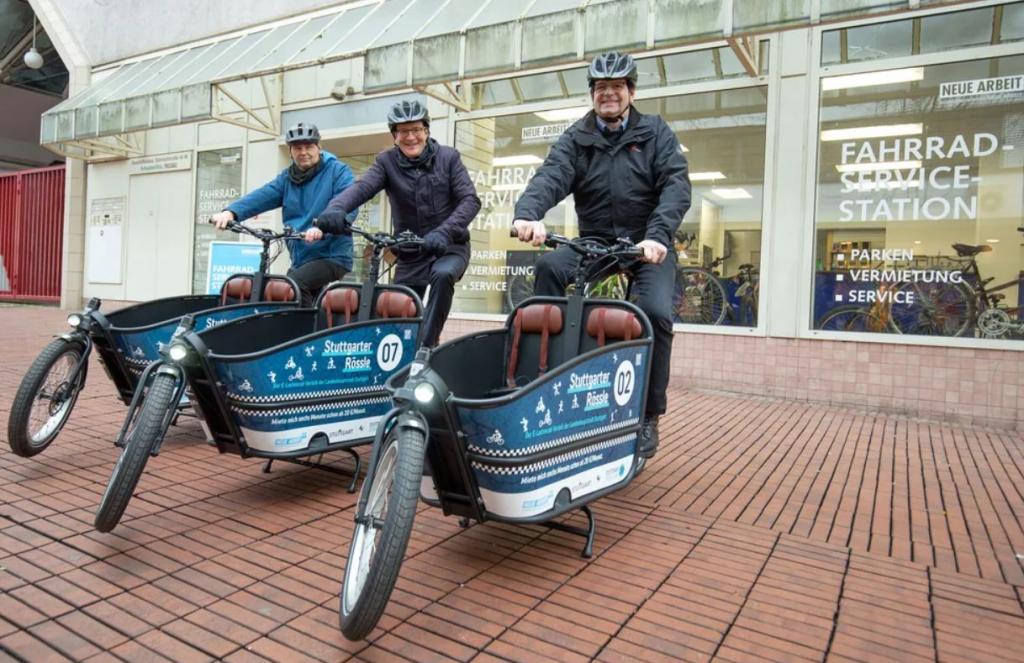Thessaloniki gets ready for its metro launch in November
The underground rapid transit lines have been under construction for almost two decades due to various project delays
 TheMayor.EU logo
TheMayor.EU logo 
The new electric cargo bikes are perfect for getting kids to where they need to go , Source: City of Stuttgart
The new service is aimed at low-income households, which quite often cannot afford a car
On Tuesday, the city of Stuttgart in Germany launched a cargo bike rental service aimed specifically at low-income households. According to a statement by the city, electric bikes can replace cars for some, as they offer ample cargo space, as well as secure seating for children.
Additionally, the city will provide a total of 60 electric cargo bikes, 30 of which are already available. The second half will come into Stuttgart’s inventory in February 2023. Also, the bikes will be available only through a long-term rental scheme, with prices pegged to a household’s income.
According to Stuttgart officials, buying an electric cargo bike is a luxury that some households just cannot afford, especially considering some do not even have a car. This is why local authorities see this as a mobility social offer.
The bikes can only be rented through a long-term agreement with Stuttgart, that lasts a minimum of six months. This is because there are quite a few short-term rental offers in the city. The plan is intended to function more like a subscription to public transport. After the initial six months, the rental agreement for the bikes can be terminated on a month-by-month basis.
Also, while the bikes are open to all Stuttgart residents, they are mostly aimed at low-income households. This is why the city has decided that rental prices will be pegged to a household’s income. Thus, the bikes could cost as low as 20 euros per month.
They also feature a large transport box that can be fitted with chairs and seatbelts with the contact points, making them a perfect sustainable option for getting children to where they need to go.

The underground rapid transit lines have been under construction for almost two decades due to various project delays

Now you can get your wine in Talence by paying directly in Bitcoin

That’s because the state has to spend money on updating the railway infrastructure rather than subsidizing the cost of the popular pass

Rethinking renewable energy sources for the urban landscape

The examples, compiled by Beyond Fossil Fuels, can inform and inspire communities and entrepreneurs that still feel trepidation at the prospect of energy transition

Now you can get your wine in Talence by paying directly in Bitcoin

The 10th European Conference on Sustainable Cities and Towns (ESCT) sets the stage for stronger cooperation between the EU, national and local level to fast track Europe's transition to climate neutrality.

At least, that’s the promise made by the mayor of Paris, Anne Hidalgo

The underground rapid transit lines have been under construction for almost two decades due to various project delays

At least, that’s the promise made by the mayor of Paris, Anne Hidalgo

Hostal de Pinós is located in the geographical centre of the autonomous region

Despite its church-y name, the district has long been known as the hangout spot for the artsy crowds

Urban dwellers across the EU are having a say in making their surroundings friendlier to people and the environment.

Forests in the EU can help green the European construction industry and bolster a continent-wide push for architectural improvements.

Apply by 10 November and do your part for the transformation of European public spaces

An interview with the Mayor of a Polish city that seeks to reinvent itself

An interview with the newly elected ICLEI President and Mayor of Malmö

A conversation with the Mayor of Lisbon about the spirit and dimensions of innovation present in the Portuguese capital














